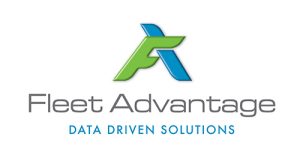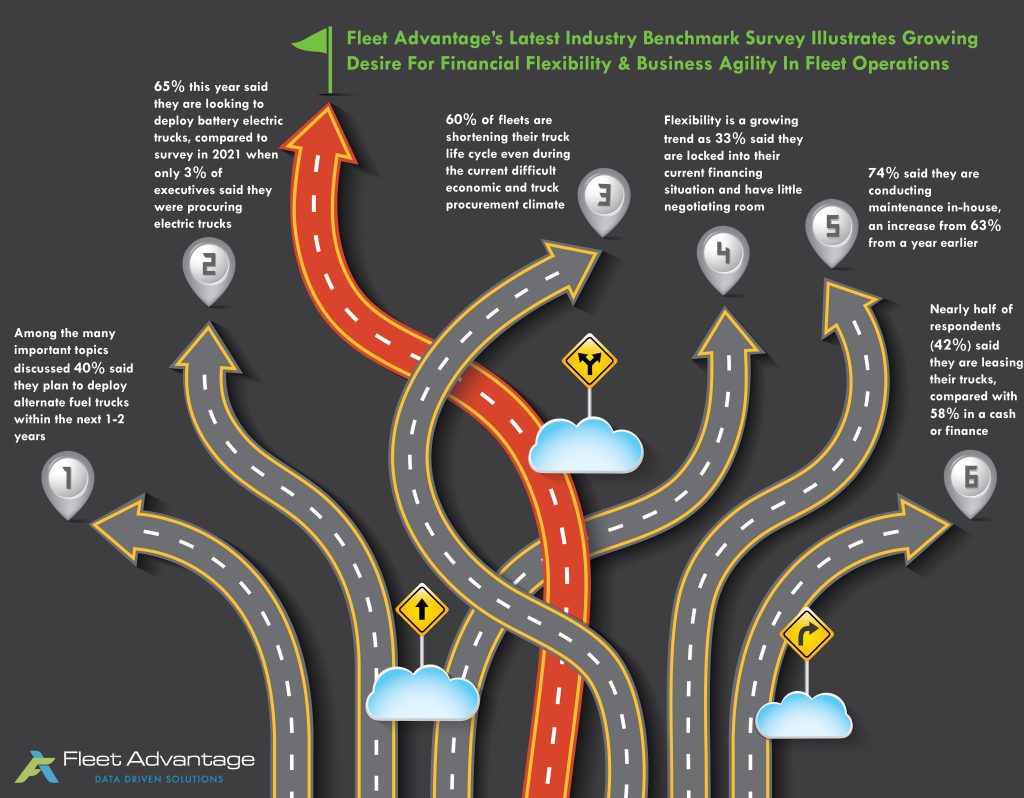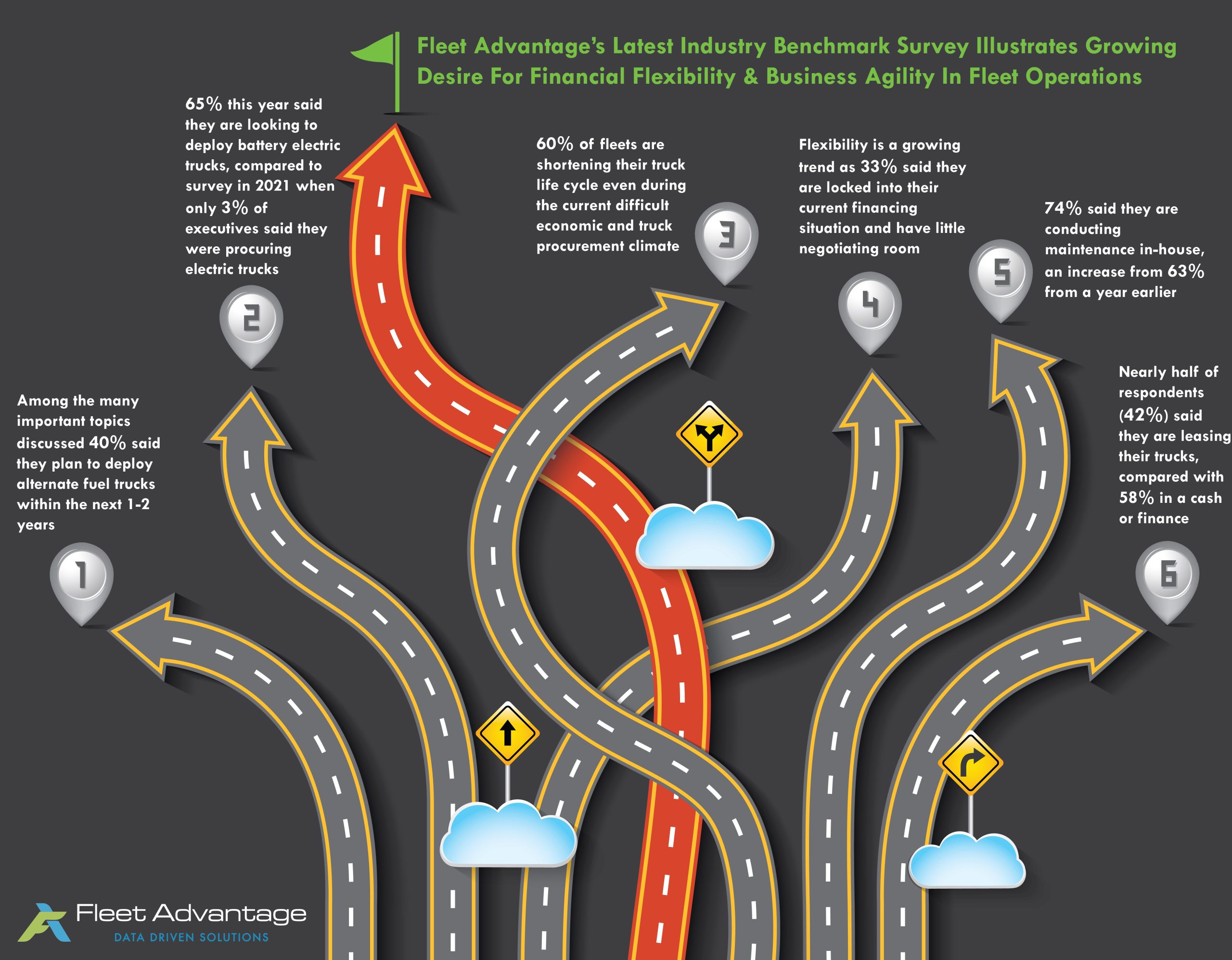Alternate Fuels Adoption Increase: Uncovering Shifts in the Trucking Industry

Fleet Advantage, a leading provider of Class-8 fleet data analytics, equipment financing, and life-cycle cost management (LCCM), has recently released its latest benchmarking survey.
Fleet Advantage, a leading provider of Class-8 fleet data analytics, equipment financing, and life-cycle cost management (LCCM), has recently released its latest benchmarking survey. The survey sought industry leaders’ opinions on topics such as alternate-fuel trucks, equipment finance trends, and environment, social, and governance (ESG) strategies. The results showcase a remarkable increase in the adoption of alternate fuels among corporate fleets.
Key Findings from the Benchmarking Survey
- Accelerated Adoption of Alternate Fuel Trucks
40% of respondents plan to deploy alternate fuel trucks within the next one to two years, a significant shift from a year ago when 54% said they planned to do so within five to 10 years. This accelerated timeline indicates the growing importance of alternate fuels in the trucking industry.
- Rapid Growth in Battery Electric Trucks
65% of respondents are looking to deploy battery electric trucks, up from just 3% in 2021. This rapid increase demonstrates the industry’s commitment to reducing its carbon footprint and embracing more sustainable fuel options.
- Rising Popularity of Truck Leasing
Truck leasing has increased, with 42% of respondents leasing their trucks, up from 31% last year and 14% two years ago. This trend suggests that companies are seeking more flexible financing options to adapt to the changing market conditions and demands.
- Shorter Truck Life Cycles
59% of respondents operate their trucks for five years or less before replacement, up from 45% in the previous survey. This trend highlights the increasing focus on environmental protection and sustainability, as companies aim to reduce emissions and minimize their environmental impact.
Enjoying our insights?
Subscribe to our newsletter to keep up with the latest industry trends and developments.
Stay Informed
With changing market conditions and increased focus on environmental protection, flexibility is becoming a crucial business and financial strategy. The survey findings emphasize the importance of data analytics and asset management partners in helping companies meet short and long-term goals.
Emphasis on Financial Flexibility and Environmental Protection
With changing market conditions and increased focus on environmental protection, flexibility is becoming a crucial business and financial strategy. The survey findings emphasize the importance of data analytics and asset management partners in helping companies meet short and long-term goals.
Monitoring Key Financial Metrics for Better Decision-Making
To better understand financial flexibility, organizations need to track additional key financial metrics, including:
- Sales tax analysis: Understanding the tax implications of different financing options can help companies make informed decisions about their fleet financing strategy.
- Comparative cost analysis: By comparing the costs of different equipment upgrade timings, companies can identify the optimal time to upgrade their fleet to minimize costs and maximize efficiency.
- Per unit profit and loss: Monitoring the profitability of individual trucks can help identify under performing assets and inform decisions about equipment replacement or upgrades.
- OEM equipment cost tracking: By tracking the cost of equipment from different manufacturers, companies can negotiate better deals and optimize their procurement process.
- SWAP rates: Monitoring swap rates can help companies better understand the interest rate environment and make more informed decisions about their fleet financing strategy.
- Residual values: Estimating the residual value of trucks at the end of their life cycle can help companies better plan for equipment replacement and disposal.
- Predictive life cycle modeling: Using predictive modeling to estimate the total cost of ownership over the life of a truck can help companies optimize their fleet management strategy and minimize costs.
Fleet Advantage: A Leader in the Industry

Data analytics plays a critical role in modern fleet management, enabling companies to make data-driven decisions that improve efficiency, reduce costs, and enhance sustainability.
Fleet Advantage is the largest independent lessor for heavy-duty Class-8 trucks and boasts over $2.4 billion in assets and more than 50 customers. This includes America’s top corporate fleets, with five of the top 10 private fleets in the country. Fleet Advantage’s expertise and industry-leading solutions make them an invaluable partner for companies looking to optimize their fleet management strategies and adapt to the increasing adoption of alternate fuels.
The Role of Data Analytics in Fleet Management
Data analytics plays a critical role in modern fleet management, enabling companies to make data-driven decisions that improve efficiency, reduce costs, and enhance sustainability. Fleet Advantage’s data analytics solutions help organizations monitor key performance indicators (KPIs), identify trends, and uncover opportunities for improvement. By leveraging data, companies can better understand their fleet’s performance, make more informed decisions, and stay ahead of the competition.
Conclusion
The current economic climate presents numerous challenges for fleets across the country, which is why flexibility is an essential business and financial strategy to meet corporate and ESG goals. Fleet Advantage’s latest benchmarking study highlights the increasing desire for companies to work with asset management partners who offer the right programs to benefit all aspects of their organization and achieve both short- and long-term objectives. As alternate fuels adoption continues to increase, companies must adapt and prioritize sustainable, flexible strategies for success. Embracing data analytics, pursuing financial flexibility, and focusing on environmental protection are crucial factors in ensuring the future success of the trucking industry.
More News on Alternative Fuels from TankTransport
Incentives and Programs for Alternative Fuel Vehicles: A resource page listing various incentives and programs available for businesses looking to adopt alternative fuel vehicles for their fleets
External Resources on Alternative Fuels
- U.S. Department of Energy – Alternative Fuels Data Center: Provides comprehensive information on alternative fuels, advanced vehicles, and related laws, incentives, and programs.
- International Energy Agency (IEA) – Energy Technology Perspectives: Offers insights into key technologies and innovations driving the global transition to clean energy, including alternative fuels in the transportation sector.
- National Renewable Energy Laboratory (NREL) – Transportation Research: NREL conducts research on advanced transportation technologies, including alternative fuels, to help improve energy efficiency, reduce emissions, and increase the adoption of sustainable transportation solutions.
- Deloitte – Future of Mobility: Deloitte’s insights on the future of mobility, including trends and developments in alternative fuels and electric vehicles.
- McKinsey & Company – The Future of Trucking: This article discusses the potential for alternative fuels in the trucking industry and the challenges that need to be addressed for widespread adoption.
- American Transportation Research Institute (ATRI) – Research on Alternative Fuels: ATRI conducts research on a variety of topics, including alternative fuels, to support informed decision-making in the trucking industry.
- CALSTART – Driving Clean Transportation: CALSTART is a nonprofit organization that works with businesses, fleets, and government to develop and implement clean, efficient transportation solutions, including the adoption of alternative fuels.




















